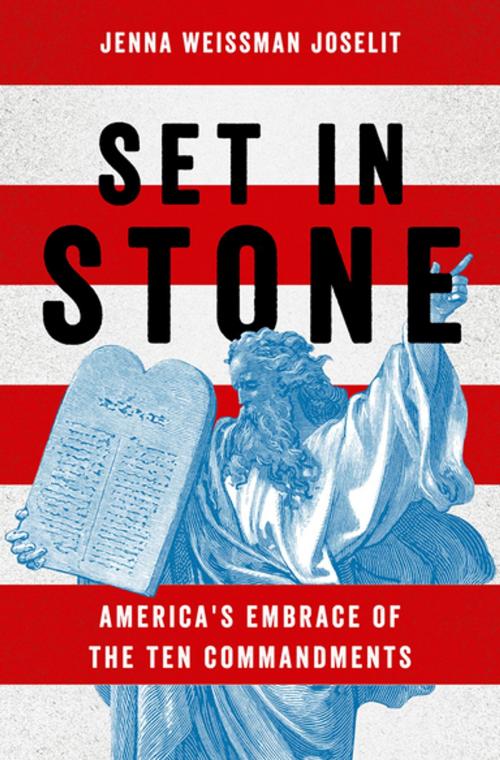Set in Stone
America's Embrace of the Ten Commandments
Nonfiction, Religion & Spirituality, Bible & Bible Studies, Old Testament, Criticism & Interpretation, History, Americas, United States| Author: | Jenna Weissman Joselit | ISBN: | 9780190253219 |
| Publisher: | Oxford University Press | Publication: | March 31, 2017 |
| Imprint: | Oxford University Press | Language: | English |
| Author: | Jenna Weissman Joselit |
| ISBN: | 9780190253219 |
| Publisher: | Oxford University Press |
| Publication: | March 31, 2017 |
| Imprint: | Oxford University Press |
| Language: | English |
When Cecil B. DeMille's epic, The Ten Commandments, came out in 1956, lines of people crowded into theaters across America to admire the movie's spectacular special effects. Thanks to DeMille, the commandments now had fans as well as adherents. But the country's fascination with the Ten Commandments goes well beyond the colossal scenes of this Hollywood classic. In this vividly rendered narrative, Jenna Weissman Joselit situates the Ten Commandments within the fabric of American history. Her subjects range from the 1860 tale of the amateur who claimed to have discovered ancient holy stones inside a burial mound in Ohio to the San Francisco congregation of Sherith Israel, which commissioned aluminous piece of stained glass depicting Moses in Yosemite for its sanctuary; from the Kansas politician Charles Walter, who in the late nineteenth century proposed codifying each commandment into state law, to the radio commentator Laura Schlessinger, who popularized the Ten Commandments as a psychotherapeutic tool in the 1990s. At once text and object, celestial and earthbound, Judaic and Christian, the Ten Commandments were not just a theological imperative in the New World; they also provoked heated discussions around key issues such as national identity, inclusion, and pluralism. In a country as diverse and heterogeneous as the United States, the Ten Commandments offered common ground and held out the promise of order and stability, becoming the lodestar of American identity. While archaeologists, theologians, and devotees across the world still wonder what became of the tablets that Moses received on Mount Sinai, Weissman Joselit offers a surprising answer: they landed in the United States.
When Cecil B. DeMille's epic, The Ten Commandments, came out in 1956, lines of people crowded into theaters across America to admire the movie's spectacular special effects. Thanks to DeMille, the commandments now had fans as well as adherents. But the country's fascination with the Ten Commandments goes well beyond the colossal scenes of this Hollywood classic. In this vividly rendered narrative, Jenna Weissman Joselit situates the Ten Commandments within the fabric of American history. Her subjects range from the 1860 tale of the amateur who claimed to have discovered ancient holy stones inside a burial mound in Ohio to the San Francisco congregation of Sherith Israel, which commissioned aluminous piece of stained glass depicting Moses in Yosemite for its sanctuary; from the Kansas politician Charles Walter, who in the late nineteenth century proposed codifying each commandment into state law, to the radio commentator Laura Schlessinger, who popularized the Ten Commandments as a psychotherapeutic tool in the 1990s. At once text and object, celestial and earthbound, Judaic and Christian, the Ten Commandments were not just a theological imperative in the New World; they also provoked heated discussions around key issues such as national identity, inclusion, and pluralism. In a country as diverse and heterogeneous as the United States, the Ten Commandments offered common ground and held out the promise of order and stability, becoming the lodestar of American identity. While archaeologists, theologians, and devotees across the world still wonder what became of the tablets that Moses received on Mount Sinai, Weissman Joselit offers a surprising answer: they landed in the United States.















